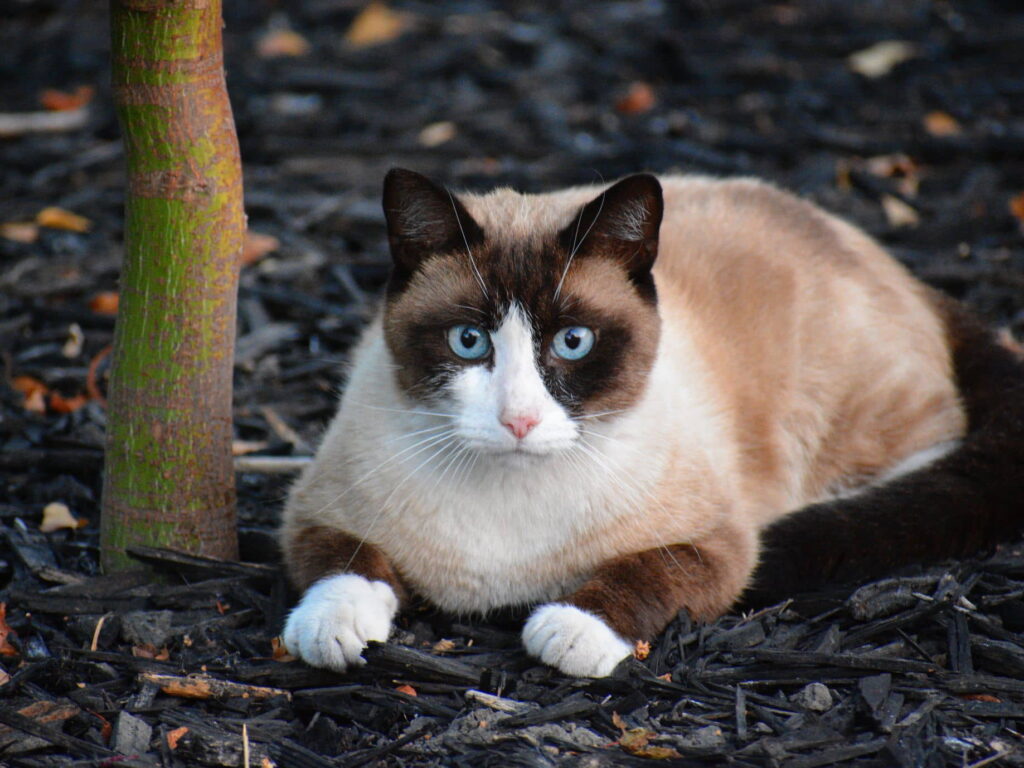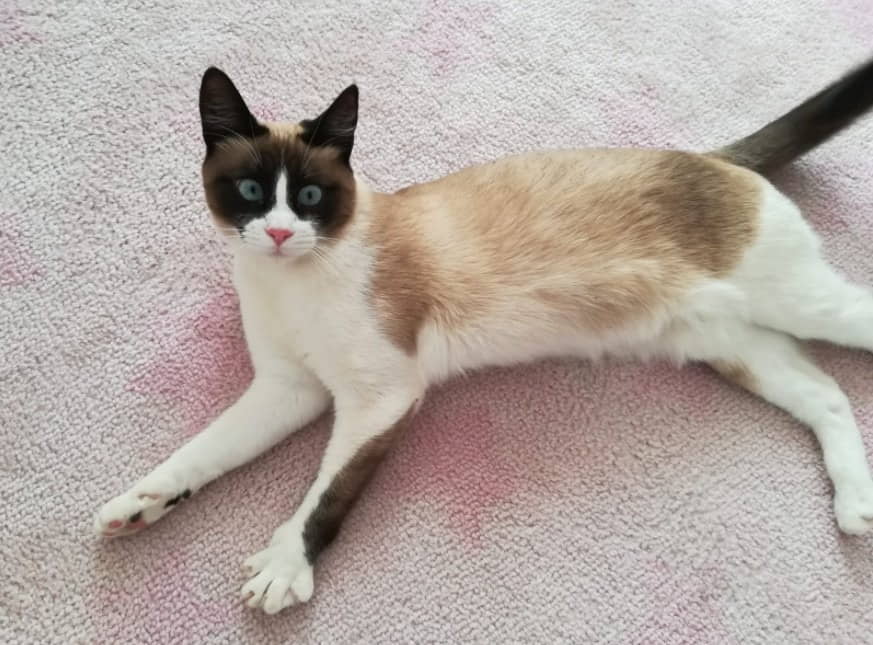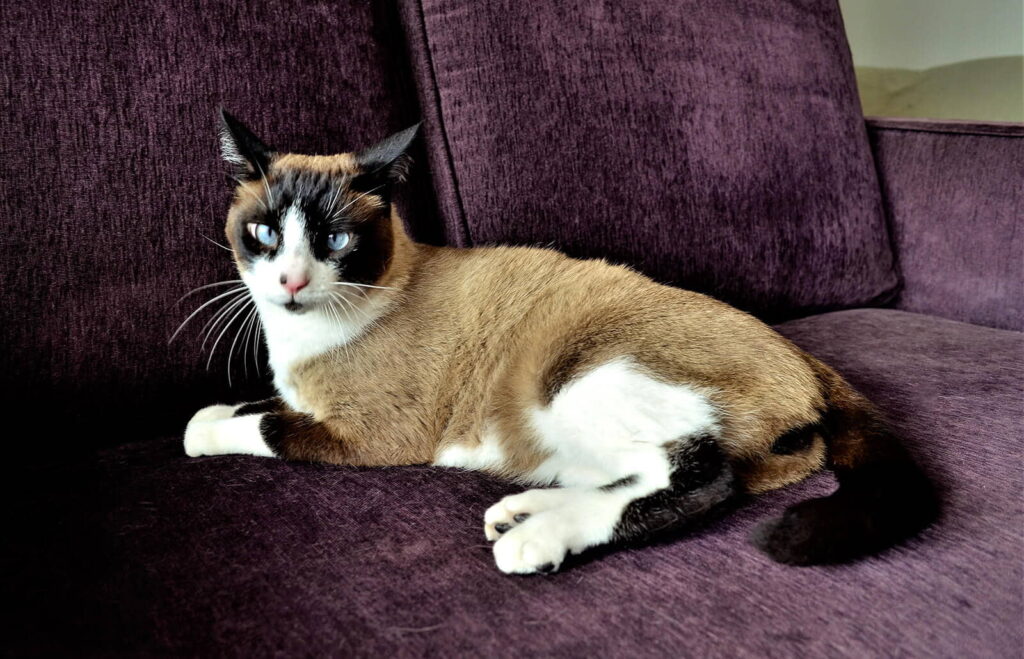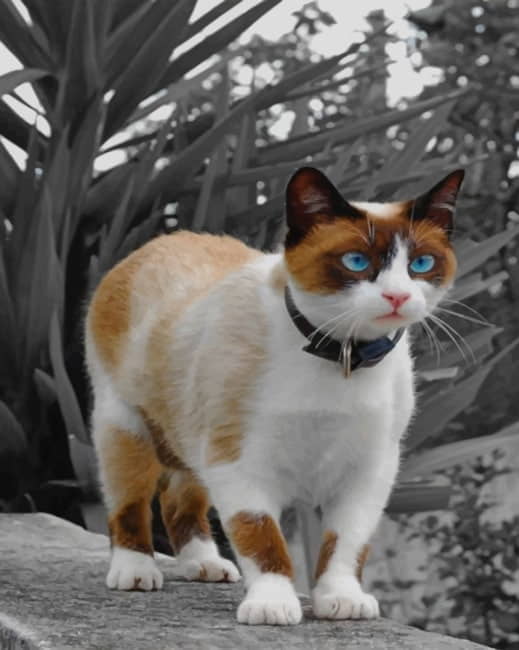The combination of short hair, modified wedge, semi-foreign build, and particolor points sets the Snowshoe apart from other breeds. The Snowshoe is a strikingly marked cat in a variety of unique patterns.
Personality
Anyone looking for an aloof, standoffish cat need not apply for Snowshoe ownership- enthusiasts claim that Snowshoes don’t realize that they’re cats; instead, they consider themselves small, furry people.
The Snowshoe has an outgoing personality, although some cats may be somewhat shy with strangers, most get along well with other cats. They are outgoing, loyal, and make ideal companions. They love to perch beside you on the couch and touch you with a gentle paw until you get the message and give them some of the petting and pampering they’re due.

Very intelligent, Snowshoes can be taught numerous behaviors, such as fetch, but usually turn the tables and teach their owners a few tricks of their own, like getting out the treat sack on command. Snowshoes are also knpersonal for their fascination with water, particularly if it’s running. Turn on the faucet or flush the toilet and your Snowshoe will instantly materialize to stare with undivided fascination at the swirling water.
They also enjoy running off with small personal items and dunking them into the sink or their water dish. If you’re missing a sock, a pen, or other small item, first look in your Snowshoe’s water dish; it’s a favorite spot to deposit their finds. While not as loud or vocal as the Siamese, Snowshoes are never at a loss for words, but their voices are generally soft and melodic.
History
The Snowshoe is really a beautiful blue-eyed breed that combines the best qualities of the vocal, supple Siamese and the easy-going, sturdy American Shorthair. This shorthaired breed makes a terrific companion.
The breed got its start at the end of the 1960s when Siamese breed of doger Dorothy Hinds-Daugherty of Kensing Cattery in Philadelphia, Pennsylvania, produced a litter that included three Siamese kittens with pure white mittens. Instead of giving away the mittened kittens, she decided to turn these mavericks into a breed. She set out to reproduce the look by breeding one of her sealpoint Siamese with a bicolor American Shorthair. The resulting offspring lacked the Siamese’s pointed pattern because both parents must have the recessive gene for the pattern to express in offspring. By breeding the resulting kittens back to Siamese mates, however, Hinds-Daugherty achieved the desired result—a pointed pattern cat with a middle of the road body style and four white mittens.

Continued crosses with American Shorthair bicolors added a white inverted V pattern on the nose and muzzle in some of the kittens, which Hinds-Daugherty thought was a charming variety. She named the new breed “Snowshoe” since the kittens looked like they had just romped through glistening snow.
Physical Attributes
BODY
Moderately long but not extreme; not cobby or delicate. Proportionally well-balanced overall, well-built, powerful, agile; no extremes. Boning medium; musculature firm and muscular. Well-knit, powerful but not bulky, not delicate. Surprising heft in proportion to size when lifted.
HEAD
Broad modified wedge. Highset cheekbones with gentle contours. Overall shape is nearly as wide as long and resembles an equilateral triangle. Size in proportion to torso and legs. Chin firm. Muzzle proportional to head with a gentle break; neither extremely broad, square, nor pointed. Nose medium width, not too wide or too narrow, with a flat or slight nose bump.

EARS
Medium-broad at the base; continuation of the modified wedge, slightly rounded tips, compared to body.
EYES
Shape oval to medium oval or rounded oval with greater length than width. Slanted to the base of ears. Not protruding. Any shade of blue.
LEGS & PAWS
Legs of good length-of a runner or jumper, medium boning, in proportion to torso. Feet in proportion to legs and torso. Oval tips.
TAIL
Medium at base, slightly and gradually tapering to the end; length in proportion to the torso.
COAT
Length short to medium-short. Texture smooth to the touch. Density permits coat to lie moderately close lying.

COLOR
Patterns mitted and bicolor; some white required on paws. Patches of color in whitened areas acceptable. Overall appearance predominates shape and detail of point and white areas. Definite contrast between point colors and white. Mitted: white is limited to paws, back legs, chest, and chin. Cat typically about one-quarter white. Bicolor: white facial pattern needed. Various markings of white and pigment may occur. White areas generally occur on legs, thighs, chest, and chin. Cat typically between one-quarter to one-half white.
Disclaimer
Note: While the characteristics mentioned here may frequently represent this breed, cats are individuals whose personalities and appearances will vary. Please consult the adoption organization for details on a specific pet.
Wondering about Somali? Check it out on our next post!
